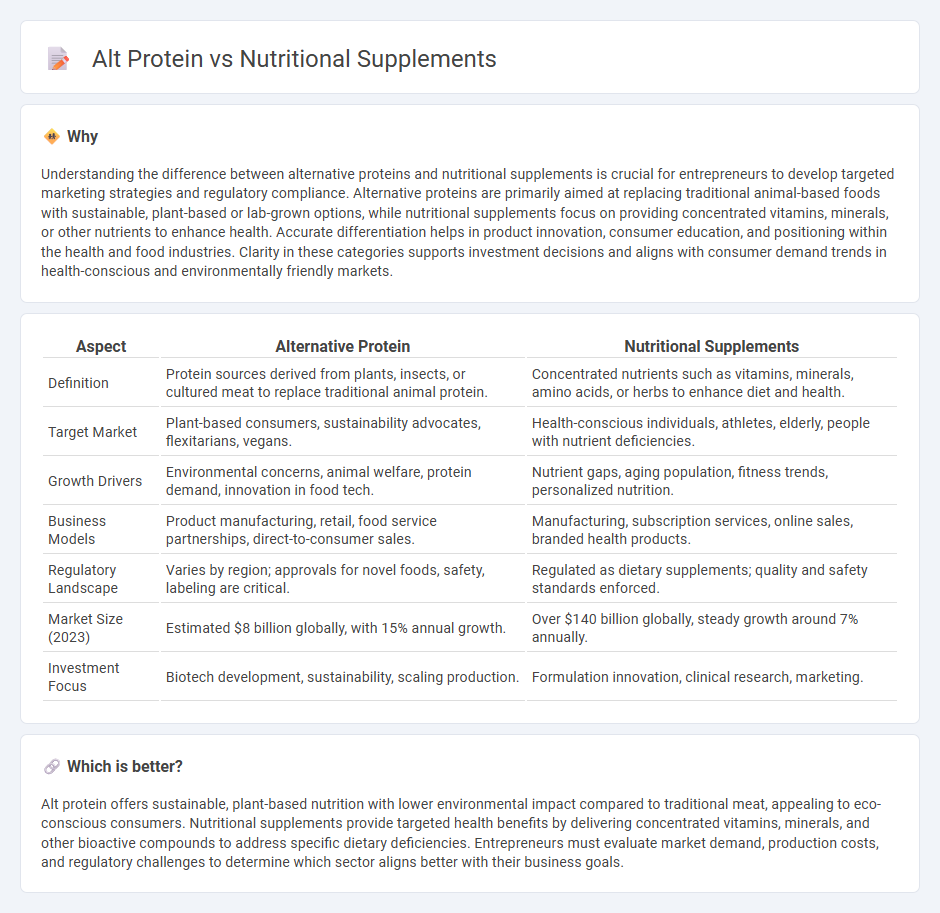
Entrepreneurship in the alternative protein sector focuses on innovative food solutions that address sustainability and health challenges, distinct from the traditional nutritional supplements market aimed at dietary enhancement and wellness support. Investors and entrepreneurs pivot toward plant-based, cultured, and fermentation-derived proteins to meet the demands of environmentally conscious consumers. Explore how these industries diverge and the business opportunities that drive their growth.
Why it is important
Understanding the difference between alternative proteins and nutritional supplements is crucial for entrepreneurs to develop targeted marketing strategies and regulatory compliance. Alternative proteins are primarily aimed at replacing traditional animal-based foods with sustainable, plant-based or lab-grown options, while nutritional supplements focus on providing concentrated vitamins, minerals, or other nutrients to enhance health. Accurate differentiation helps in product innovation, consumer education, and positioning within the health and food industries. Clarity in these categories supports investment decisions and aligns with consumer demand trends in health-conscious and environmentally friendly markets.
Comparison Table
| Aspect | Alternative Protein | Nutritional Supplements |
|---|---|---|
| Definition | Protein sources derived from plants, insects, or cultured meat to replace traditional animal protein. | Concentrated nutrients such as vitamins, minerals, amino acids, or herbs to enhance diet and health. |
| Target Market | Plant-based consumers, sustainability advocates, flexitarians, vegans. | Health-conscious individuals, athletes, elderly, people with nutrient deficiencies. |
| Growth Drivers | Environmental concerns, animal welfare, protein demand, innovation in food tech. | Nutrient gaps, aging population, fitness trends, personalized nutrition. |
| Business Models | Product manufacturing, retail, food service partnerships, direct-to-consumer sales. | Manufacturing, subscription services, online sales, branded health products. |
| Regulatory Landscape | Varies by region; approvals for novel foods, safety, labeling are critical. | Regulated as dietary supplements; quality and safety standards enforced. |
| Market Size (2023) | Estimated $8 billion globally, with 15% annual growth. | Over $140 billion globally, steady growth around 7% annually. |
| Investment Focus | Biotech development, sustainability, scaling production. | Formulation innovation, clinical research, marketing. |
Which is better?
Alt protein offers sustainable, plant-based nutrition with lower environmental impact compared to traditional meat, appealing to eco-conscious consumers. Nutritional supplements provide targeted health benefits by delivering concentrated vitamins, minerals, and other bioactive compounds to address specific dietary deficiencies. Entrepreneurs must evaluate market demand, production costs, and regulatory challenges to determine which sector aligns better with their business goals.
Connection
The entrepreneurship landscape is rapidly evolving with the rise of alt protein and nutritional supplements, driving innovation in sustainable food solutions and health optimization. Startups in this space leverage advances in biotechnology and nutrition science to develop products that address global challenges like food security and dietary deficiencies. Market demand for plant-based proteins and functional supplements fuels entrepreneurial ventures focused on creating scalable, eco-friendly, and health-conscious alternatives.
Key Terms
Product Differentiation
Nutritional supplements primarily offer concentrated vitamins, minerals, and antioxidants targeting specific health benefits, while alternative proteins focus on providing plant-based or lab-grown protein sources that mimic animal-derived proteins in taste and texture. Key differentiation lies in their formulation: supplements often come as pills, powders, or liquids for targeted nutrient intake, whereas alt proteins are designed as meat substitutes or protein-rich foods supporting sustainability and dietary preferences. Explore how these product distinctions influence consumer choices and market dynamics.
Regulatory Compliance
Nutritional supplements and alternative proteins face distinct regulatory compliance frameworks that ensure product safety, labeling accuracy, and health claims substantiation. Regulatory bodies such as the FDA and EFSA enforce strict guidelines on ingredient disclosure, manufacturing practices, and marketing for both sectors, but alternative proteins often encounter evolving regulations due to their novel nature and production methods. Explore our detailed analysis to understand how compliance impacts innovation and market entry in nutritional supplements and alternative proteins.
Market Positioning
Nutritional supplements dominate the health and wellness market by targeting specific deficiencies and enhancing overall well-being, while alternative proteins focus on sustainability and ethical consumption trends within the global food sector. Supplements capitalize on established consumer habits and regulatory frameworks, whereas alt proteins appeal to eco-conscious and plant-based demographics seeking innovative nutrition sources. Explore the evolving market positioning strategies shaping the future of both industries.
Source and External Links
FDA 101: Dietary Supplements - Dietary supplements, including vitamins, minerals, herbs, amino acids, and probiotics, can help improve health but carry risks, so consulting healthcare professionals is important; they are regulated differently from drugs by the FDA and come in many forms like tablets and powders.
Dietary Supplement Fact Sheets - The NIH provides detailed fact sheets on a variety of dietary supplements such as vitamins (B1, B12, calcium), minerals, herbs, and probiotics, explaining their sources, health roles, and usage.
Supplements: A scorecard - Harvard Health - While common supplements like vitamin B12 and folate can be essential for specific populations, evidence does not support that multivitamins broadly enhance health or prevent illness; vitamin D supplementation is often recommended at higher doses than commonly found in multivitamins.
 dowidth.com
dowidth.com